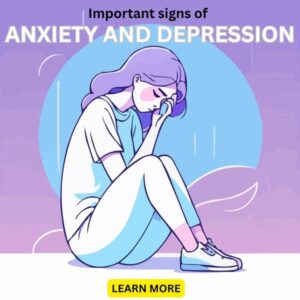
Important Signs of Anxiety and Depression
In today’s fast-paced world, anxiety and depression have become increasingly prevalent, affecting millions across the globe. Recognizing the important signs of these conditions can be a pivotal step towards understanding and ultimately addressing mental health challenges. This article delves into the subtle yet significant manifestations of anxiety and depression, bringing to light the importance of awareness and early intervention.
Understanding the Signs
Anxiety and depression often coexist, sometimes making it difficult to distinguish between the two. Both conditions can manifest in physical and emotional symptoms, often leading to a cycle of distress and confusion. Key signs to look out for include:
- Persistent Sadness: A lingering feeling of emptiness or hopelessness.
- Increased Irritability: Heightened frustration or anger over minor issues.
- Physical Symptoms: Headaches, fatigue, or unexplained aches.
- Social Withdrawal: A tendency to isolate oneself from friends and loved ones.
Being aware of these signals is crucial, as it allows individuals to seek help early, potentially mitigating the progression of these conditions.
The Unique Interplay of Symptoms
While both anxiety and depression share common features, they can present a unique array of symptoms that warrant attention. Anxiety may fuel feelings of unease and constant worry, while depression often envelops individuals in a fog of indifference and despair. This compelling contrast highlights the importance of recognizing:
- Cognitive Distortions: Catastrophic thinking and negative self-talk can plague both conditions.
- Changes in Sleep Patterns: Insomnia or excessive sleeping can be significant indicators.
- Loss of Interest: A disinterest in activities once enjoyed is a hallmark of depression.
- Difficulty Concentrating: Anxiety may cause racing thoughts, while depression can lead to a foggy mind.
Understanding these distinctions can empower individuals to articulate their experiences and seek appropriate support.
The Benefits of Awareness
Recognizing the signs of anxiety and depression not only aids in personal diagnosis but also fosters a culture of empathy and understanding. By shining a light on these conditions, we encourage open dialogue and reduce the stigma surrounding mental health. This awareness can lead to:
- Better Communication: Facilitating conversations about feelings can enhance relationships.
- Timely Intervention: Early recognition can lead to prompt treatment options, improving outcomes.
- Resource Accessibility: Knowledge empowers individuals to seek support and utilize available resources.
Taking the Next Steps
In conclusion, acknowledging the signs of anxiety and depression is a vital step toward healing. Whether for yourself or a loved one, understanding these conditions can open the door to effective management strategies. Embrace this knowledge, and equip yourself with the tools needed for recovery. Remember, reaching out for help is a sign of strength, not weakness, and every step taken towards understanding mental health can lead to a more fulfilling life.
